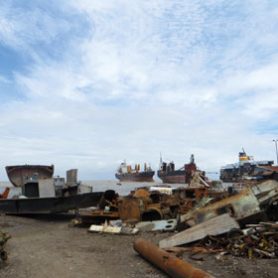Ship recycling and the Hong Kong Convention

At the end of a ship’s lifetime, the logical, green response is to recycle it. This makes environmental and economic sense, not just for ship owners but also for the communities where ship recycling has become so important.
Almost every part of a ship can be recycled – steel, machinery, equipment, fittings and furniture. Virtually nothing goes to waste and the materials and equipment are almost entirely reused and recycled. Moreover, ship recycling provides direct and secondary employment for thousands of workers, both in the industry itself and in the ancillary markets for materials and components, particularly in the five countries where most of the world’s ship recycling is carried out today – Bangladesh, China, India, Pakistan and Turkey.
The United Nations’ International Maritime Organization (IMO) has, since it was founded in 1948, focused on the global regulation of ships themselves, ensuring they are fit for purpose in terms of safety, security and environmental protection.
In the 2000s, responding to the need to address risks associated with ship recycling, IMO ventured into new territory by embracing the regulation of ship recycling – not only for ships, but also for land-based recycling facilities – into a single, comprehensive instrument. The International Convention on the Safe and Environmentally Sound Recycling of Ships, the so-called Hong Kong Convention, was adopted in 2009.
The Convention embraces the ‘cradle to grave’ concept for the purpose of addressing all environmental and safety aspects relating to ship recycling. It takes into account all aspects, from the ship’s design stage onwards and right through to the end of the ship’s life. It also includes the responsible management and disposal of associated waste streams in a safe and environmentally sound manner.
Stefan MicallefWhen the Hong Kong Convention enters into force, it will provide inclusive and effective standards that can be applied universally. It places responsibilities and obligations on all parties concerned – ship owners, ship building yards, ship recycling facilities, flag states, port states, recycling states, etc. The Convention, the first ever to address ship recycling issues, is aimed at ensuring that ships, when being recycled after reaching the end of their operational lives, do not pose any unnecessary risk to human health and safety or to the environment.
This reflects the desire by IMO and the worldwide maritime community to have global, worldwide treaties in place that set a level playing field and look for the highest practicable levels of safety and environmental protection when it comes to shipping, and which are applied universally.
Ships to be sent for recycling will be required to carry an Inventory of Hazardous Materials on board, while ship recycling facilities authorised by competent authorities will be required to provide a ‘Ship Recycling Plan’, specific to each individual vessel to be recycled. Governments will be required to ensure that recycling facilities under their jurisdiction comply with the Hong Kong Convention.
To date, the Convention has secured five ratification/accessions, regrettably not sufficient to bring it into force, although there are positive indications that ratification is currently under serious consideration by a number of governments. Meanwhile, IMO’s Marine Environment Protection Committee has already developed and adopted all six guidelines required by the Convention, which are critical to early, voluntary implementation of the Convention’s provisions, ahead of its entry into force. These guidelines cover the development of the Ship Recycling Plan and the Inventory of Hazardous Materials, safe and environmentally sound ship recycling, authorisation of ship recycling facilities, survey and certification and inspection of ships. Adherence to these guidelines now, in advance of the entry into force of the Convention, would therefore start a welcome process of incremental improvement, which would greatly facilitate a smooth transition to their future mandatory implementation.
Raising awareness
In the meantime, through workshops, training and other similar projects, IMO is currently raising awareness of the Convention internationally and in particular is working with recycling countries, to help build the capacity and establish the conditions that will enable them to ratify/accede to the Hong Kong Convention. It is a complex issue, often involving many different ministries and industry groups in those countries.
A good example of this work is the project ‘Safe and Environmentally Sound Ship Recycling in Bangladesh – Phase I’ (SENSREC Project – Bangladesh), which was launched in January 2015 and is funded by the Norwegian Agency for Development Cooperation (Norad) and the European Union and jointly implemented by IMO, the Government of Bangladesh and the Secretariat of the Basel, Rotterdam and Stockholm Conventions (BRS). During the course of the project, a series of studies have been completed and training materials developed, aimed at boosting safety and environmental standards in the country’s ship recycling industry.
The Hong Kong Convention is currently the only workable international instrument regulating ship recycling. More importantly, it allows for future improvements, providing a platform and an avenue for even better regulation, in due course, of an activity that is the economic lifeblood of many communities, especially in south Asia.
About the author
Stefan Micallef is Director of the Marine Environment Division, International Maritime Organization – the United Nations’ specialised agency with responsibility for developing and adopting regulations and standards for ship safety and security and for the prevention of pollution from ships.
Further information
www.imo.org


